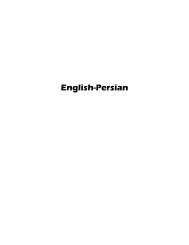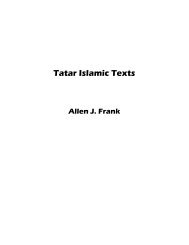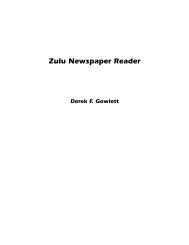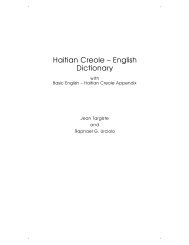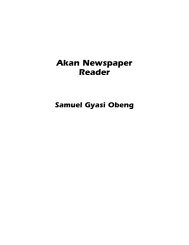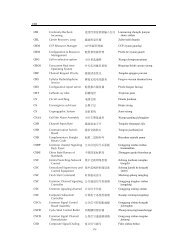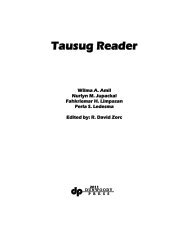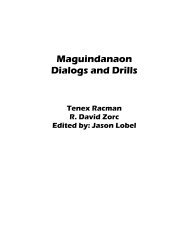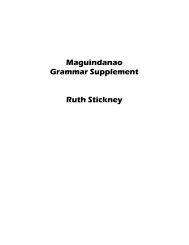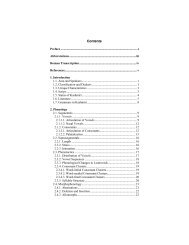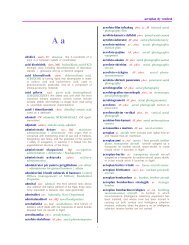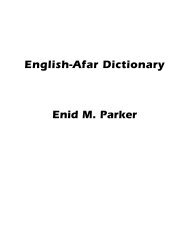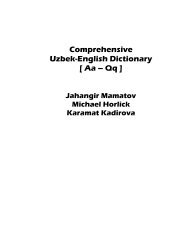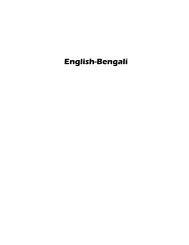A Course in Modern Geg Albanian - Dunwoody Press
A Course in Modern Geg Albanian - Dunwoody Press
A Course in Modern Geg Albanian - Dunwoody Press
Create successful ePaper yourself
Turn your PDF publications into a flip-book with our unique Google optimized e-Paper software.
<strong>Geg</strong>nishtja e Sotme Mësimi i Parë<br />
1. Bisedë (Conversation)<br />
Hysniu: Tung Xhev!<br />
Xhevdeti: Tung shoqi! Qysh je vëlla? A je mirë?<br />
MËSIMI I PARË<br />
Hysniu: Krejt rahat, shëndosh jam. Falemnderit. A je lodhë ti?<br />
Xhevdeti: Nga pak, vëlla. A ka najsen të re?<br />
Hysniu: Jo. Njiherë jo. Hajt pra. Shëndet. Mirupafshim!<br />
Xhevdeti: Po, mirupafshim. Shifemi prapë.<br />
Fjalorth (Vocabulary)<br />
All the vocabulary presented <strong>in</strong> these lessons is listed <strong>in</strong> an <strong>Albanian</strong> to English glossary at the end of the<br />
book for ease of reference.<br />
Hysni, Xhevdet (Xhev) <strong>Albanian</strong> male names<br />
tung (short for tungat,<br />
tungjatjeta)<br />
hi! hello!<br />
shok/shoqi friend, mate<br />
qysh how<br />
(ti) je you are (familiar form)<br />
vëlla brother/mate<br />
mirë good, f<strong>in</strong>e, okay<br />
krejt completely, entirely<br />
rahat f<strong>in</strong>e<br />
shëndosh<br />
(pronounced:<br />
shnosh)<br />
healthy, <strong>in</strong> good health<br />
falemnderit thank you<br />
a (question marker)<br />
a je lodhë ti? are you okay?<br />
1<br />
nga pak a little, a bit<br />
ka there is<br />
najsen anyth<strong>in</strong>g, someth<strong>in</strong>g<br />
të re new<br />
jo no<br />
njiherë at the moment, right<br />
now<br />
hajt pra okay then<br />
pra then<br />
shëndet (pronounced: (good) health<br />
shnet)<br />
mirupafshim goodbye<br />
po yes<br />
shifemi we’ll see each other<br />
prapë aga<strong>in</strong>
A <strong>Course</strong> <strong>in</strong> <strong>Modern</strong> <strong>Geg</strong> <strong>Albanian</strong> First Lesson<br />
2. Sqarime (Explanations)<br />
a) The standard <strong>Albanian</strong> word for ‘hello’, tungjatjeta, literally translat<strong>in</strong>g as ‘may your life be lengthened’,<br />
is regularly abbreviated <strong>in</strong> conversation to either tungat or the more colloquial tung, as <strong>in</strong> the conversation<br />
above.<br />
b) To address a close friend <strong>in</strong> a similar way to how one might say ‘mate’ <strong>in</strong> English, <strong>Albanian</strong>s tend to use<br />
the word shok (literally ‘friend, comrade’) or the word vëlla, which literally means ‘brother’, although it is<br />
more often than not simply used to refer to a close friend.<br />
c) Kosovar and Macedonian <strong>Albanian</strong>s particularly use a myriad of expressions for say<strong>in</strong>g ‘how are you?’<br />
or ‘how’s it go<strong>in</strong>g?’ As well as the literal qysh je?, a popular expression is a je lodhë?, literally mean<strong>in</strong>g<br />
‘are you tired?’, two variations on which are: a je mërzitë? (literally ‘are you upset?’) and a po plakesh?<br />
(literally ‘are you gett<strong>in</strong>g old?) The standard response to all three is nga pak, i.e. ‘a little’, whether one is<br />
tired/upset/gett<strong>in</strong>g old, or not!<br />
d) The word shëndet literally means ‘health’, but it is used as an expression on its own to mean either ‘(I<br />
wish you) good health’, or ‘bless you’, <strong>in</strong> response to somebody sneez<strong>in</strong>g.<br />
e) Just as the <strong>Albanian</strong> word for ‘hello’ (tungjatjeta) is actually made up of a number of words sandwiched<br />
together, the word for ‘goodbye’ (mirupafshim) is also made up of several words, literally mean<strong>in</strong>g ‘may<br />
we see each other <strong>in</strong> good times’.<br />
3. Gramatikë (Grammar)<br />
a) The verbs ‘to be’: me qenë, me konë and ‘to have’: me pasë<br />
Although there is a pattern to most verbs <strong>in</strong> <strong>Albanian</strong>, the verbs ‘to be’ and ‘to have’, as <strong>in</strong> many other<br />
languages, are irregular, and their present tense forms <strong>in</strong> <strong>Geg</strong> <strong>Albanian</strong> are given below. A po<strong>in</strong>t to note is<br />
that, also as <strong>in</strong> many other languages, <strong>Albanian</strong> does not normally need to use subject pronouns (‘I, you, he,<br />
we etc.’), as verbs have specific end<strong>in</strong>gs to mark which person is do<strong>in</strong>g the action/<strong>in</strong> the state concerned.<br />
The present tense forms of jam and kam are as follows:<br />
jam/jem/jom I am kam/kem/kom I have<br />
je you are ke/ki you have<br />
âsht/â he/she/it is ka he/she/it has<br />
jemi/jena we are kemi/kena we have<br />
jeni you are keni/k<strong>in</strong>i you have<br />
janë they are kanë they have<br />
<strong>Geg</strong> <strong>Albanian</strong> pronunciation tends to differ from region to region, and the forms jam and kam above can be<br />
pronounced <strong>in</strong> the three possible ways shown. Jemi and jena and kemi and kena are virtually<br />
<strong>in</strong>terchangeable alternatives, although the jena and kena forms tend to be used <strong>in</strong> less formal registers.<br />
b) Express<strong>in</strong>g ‘you’ <strong>in</strong> <strong>Geg</strong> <strong>Albanian</strong><br />
<strong>Albanian</strong> has two forms for the English ‘you’. Ti, used <strong>in</strong> the conversation above, is a familiar form, used to<br />
address family, friends, subord<strong>in</strong>ates etc, and its form <strong>in</strong> the present tense of the verb ‘to be’ is (ti) je. Ju<br />
and the verb form jeni are used to address more than one ‘you’, regardless of how friendly or not the<br />
speaker may be with those people, OR as a polite form used when address<strong>in</strong>g strangers, superiors or anyone<br />
to whom the speaker wishes to show respect. A note of caution, however - <strong>in</strong> practice, <strong>Albanian</strong>s will quite<br />
freely swap between the two, often <strong>in</strong> the same sentence, and even the closest of friends can f<strong>in</strong>d<br />
themselves be<strong>in</strong>g addressed as ju one m<strong>in</strong>ute, and ti the next.<br />
2
<strong>Geg</strong>nishtja e Sotme Mësimi i Parë<br />
c) ‘There is, there are’<br />
The word ka, used <strong>in</strong> the conversation above, literally means ‘he, she, it has’, but it is also the translation of<br />
the English ‘there is’ or ‘there are’, as <strong>in</strong> a ka najsen të re?, ‘is there any news?’ The plural verb form kanë<br />
can also be used to express the equivalent of ‘there are’.<br />
d) Express<strong>in</strong>g a question<br />
Questions <strong>in</strong> <strong>Albanian</strong> can either be formed by chang<strong>in</strong>g one’s <strong>in</strong>tonation, as <strong>in</strong> English, or by prefix<strong>in</strong>g the<br />
sentence with the question marker a, hence a je mirë?, ‘are you okay?’ versus je mirë, ‘you are okay’, and<br />
a je lodhë?, literally ‘are you tired?’, as opposed to je lodhë, ‘you are tired’.<br />
4. Ushtrime (Practise)<br />
a) How would you say, ‘hello! How are you?’<br />
b) Reply that you are f<strong>in</strong>e, and ask ‘how are you?’ us<strong>in</strong>g a different expression.<br />
c) Ask whether there is any news.<br />
d) Reply that, just at the m<strong>in</strong>ute, there’s noth<strong>in</strong>g new.<br />
e) End the conversation by say<strong>in</strong>g ‘goodbye, we’ll see each other aga<strong>in</strong>’.<br />
f) Translate <strong>in</strong>to English:<br />
Jena mirë, falemnderit.<br />
A jeni rahat, shëndosh?<br />
Xhevdeti âsht mirë njiherë.<br />
Po, jem lodhë nga pak.<br />
5. Zakone dhe histori (Customs and history)<br />
a) A po<strong>in</strong>t to remember when face to face with an <strong>Albanian</strong> is that <strong>Albanian</strong>s shake their heads to <strong>in</strong>dicate<br />
‘yes’, and nod their heads for ‘no’!<br />
b) <strong>Geg</strong> <strong>Albanian</strong> is the national dialect of the UN-adm<strong>in</strong>istered prov<strong>in</strong>ce of Kosovo, the northern and<br />
western regions of Macedonia, border<strong>in</strong>g on Kosovo and eastern Albania, Montenegro, northern Albania as<br />
far south as the Shkumb<strong>in</strong> river (<strong>in</strong>clud<strong>in</strong>g Tirana and Elbasan) and most of the <strong>Albanian</strong> diaspora <strong>in</strong><br />
Europe and the USA. <strong>Geg</strong> is characterised by nasal vowels, monosyllabic words, little standardisation and a<br />
large number of words of Turkish orig<strong>in</strong>, ma<strong>in</strong>ly absent from the Tosk and Arbëresh dialects of southern<br />
Albania, Greece and parts of Italy. The first recorded sentence ever found <strong>in</strong> <strong>Albanian</strong>, dat<strong>in</strong>g from a 1462<br />
translation of the Lat<strong>in</strong> baptism service, was <strong>in</strong> <strong>Geg</strong>, and <strong>Geg</strong> formed the basis of the orig<strong>in</strong>al standard<br />
<strong>Albanian</strong> language <strong>in</strong> the 1920s. A standardised spell<strong>in</strong>g for written <strong>Geg</strong> <strong>Albanian</strong> was also established at<br />
Prist<strong>in</strong>a University <strong>in</strong> 1964, although it has never been widely applied.<br />
c) All ethnic <strong>Albanian</strong>s, wherever they live, and whatever their official statehood, consider the <strong>Albanian</strong><br />
National Anthem, Himni i Flamurit (‘The Hymn of the Flag’), to be their own. The Himni i Flamurit,<br />
written by Aleksandër “Asdren” Drenova <strong>in</strong> the late 19th century, was adopted as the national anthem of<br />
<strong>in</strong>dependent Albania <strong>in</strong> November 1912, but is now sung at all solemn occasions by ethnic <strong>Albanian</strong>s <strong>in</strong><br />
Kosovo and Macedonia especially, as a further affirmation of their separate identity.<br />
3
A <strong>Course</strong> <strong>in</strong> <strong>Modern</strong> <strong>Geg</strong> <strong>Albanian</strong> First Lesson<br />
d) The <strong>Albanian</strong> national flag, consist<strong>in</strong>g of the double-headed black eagle<br />
(shqiponja or shkaba dykrenore) on a red background, derives from the<br />
banner of the <strong>Albanian</strong> national hero, Gjergj Kastrioti-Skënderbeu, known<br />
<strong>in</strong> English as Skanderbeg, who held the <strong>in</strong>vad<strong>in</strong>g Ottomans at bay from the<br />
northern <strong>Albanian</strong> mounta<strong>in</strong>s <strong>in</strong> the first half of the fifteenth century, until<br />
his death <strong>in</strong> 1468.<br />
4
<strong>Geg</strong>nishtja e Sotme Mësimi i Dytë<br />
1. Bisedë (Conversation)<br />
Beqiri: Mirëmëngjesi nuse! Qysh po kalon?<br />
MËSIMI I DYTË<br />
Selvetja: Mirëmjesi Beqir! Boll mirë po shkojnë punët. Ça ka të re najsen?<br />
Beqiri: Kejt me të vjetra njiherë. Shka po bân Mirsati tash? A po punon hala në Prizren?<br />
Selvetja: Jo. Hala jo. Ai âsht tue punuë në Ferizaj momentalisht. P’e ndihmon kryetar<strong>in</strong> e partisë në Ferizaj<br />
me fushatën zgjedhore.<br />
Beqiri: Ku ku! Të lumtë dora! Gëzohem qi ka nji punë të mirë. Shpresoj qi e ka rrogën shumë e mirë!<br />
Selvetja: Jo, jo, vëlla. Fatkeqësisht, fiton veç pesëdhjetë euro në muej.<br />
Beqiri: Nejse, motra jeme. Mos u bân merak. Me kejt ato pare qi po t’i çon vllau yt pej Gjermanisë, s’ki<br />
nevojë për kurrgjâ hiç.<br />
Selvetja: Keni të drejtë. Unë e Mirsati jena shumë mirënjohës.<br />
Beqiri: Hajde pra... Dëgjohemi prapë. Të fala i bân Mirsatit!<br />
Selvetja: Të fala edhe juve. Mirë u dëgjofshim!<br />
Fjalorth (Vocabulary)<br />
mirëmëngjesi/mirëmjesi good morn<strong>in</strong>g<br />
nuse (f) married woman/bride<br />
kalon gett<strong>in</strong>g on/pass<strong>in</strong>g<br />
boll very, really (colloq.)<br />
shkojnë (they) go, are go<strong>in</strong>g<br />
punët (fpl) th<strong>in</strong>gs, matters<br />
ça/shka what<br />
me të vjetra there’s no news<br />
(lit.‘with old’)<br />
bân (he/she) does, is do<strong>in</strong>g<br />
qe tash right now<br />
punon (he/she) works, is<br />
work<strong>in</strong>g<br />
hala still, yet<br />
Prizren, Ferizaj towns <strong>in</strong> Kosovo<br />
ai âsht tue punuë he is work<strong>in</strong>g<br />
momentalisht at the moment<br />
ndihmon (he/she) helps, is<br />
help<strong>in</strong>g<br />
kryetar (m) leader, chairman<br />
e partisë (f) of the party<br />
me with<br />
fushatë (f) campaign<br />
zgjedhor/e electoral<br />
ku ku! (exclamation of<br />
admiration or<br />
5<br />
surprise)<br />
të lumtë dora! good on him! he’s done<br />
well!<br />
gëzohem I’m glad<br />
qi that<br />
punë (f) job, work<br />
shpresoj I hope<br />
rrogë (f) salary, wages<br />
shumë very/a lot of<br />
pare (f) money<br />
fatkeqësisht unfortunately<br />
fiton (he/she) w<strong>in</strong>s, is<br />
w<strong>in</strong>n<strong>in</strong>g<br />
veç only<br />
pesëdhjetë fifty<br />
euro (f) euro (unit of currency<br />
<strong>in</strong> Kosovo)<br />
muej (m) month<br />
nejse never m<strong>in</strong>d/whatever<br />
motra (f) sister<br />
jeme my<br />
mos u bân merak don’t worry<br />
çon (he/she) sends, is<br />
send<strong>in</strong>g<br />
yt your<br />
p(r)ej from
A <strong>Course</strong> <strong>in</strong> <strong>Modern</strong> <strong>Geg</strong> <strong>Albanian</strong> Second Lesson<br />
nevojë (f) need<br />
kurrgjâ noth<strong>in</strong>g<br />
hiç (noth<strong>in</strong>g) at all<br />
keni të drejtë you’re right<br />
dhe (shortened to ‘e’ <strong>in</strong><br />
conversation)<br />
and<br />
2. Sqarime (Explanations)<br />
6<br />
mirënjohës grateful<br />
dëgjohemi prapë we’ll talk aga<strong>in</strong><br />
të fala regards<br />
juve to you<br />
mirë u dëgjofshim goodbye (on the<br />
telephone)<br />
a) Other than the <strong>in</strong>formal and “all-day” greet<strong>in</strong>g tung or tungjatjeta, <strong>Albanian</strong> also has literal equivalents<br />
of the English ‘good day’, ‘good morn<strong>in</strong>g’ etcetera. As you know, the <strong>Albanian</strong> word for ‘good’ is mirë.<br />
The standard words for ‘day’, ‘morn<strong>in</strong>g’, ‘even<strong>in</strong>g’ and ‘night’ are: dita, mëngjesi (or mjesi), mbrâmje and<br />
natë. Therefore the greet<strong>in</strong>gs are (written as one word): mirëdita, mirëmëngjesi, mirëmbrâma and the<br />
slightly different natën e mirë. Just as ‘goodbye’ <strong>in</strong> <strong>Albanian</strong>, mirupafshim, literally means ‘may we see<br />
each other <strong>in</strong> good times’, ‘goodbye’ on the telephone, mirë u dëgjofshim, literally means ‘may we hear<br />
each other <strong>in</strong> good times’.<br />
b) Just as male friends are often referred to <strong>in</strong> <strong>Geg</strong> conversation as vëlla or shoqi (literally ‘brother’ or<br />
‘friend’), female friends or associates are generally referred to as motra (‘sister’) or even nuse (literally<br />
mean<strong>in</strong>g ‘bride’), if the woman is known to be married. The female equivalent of shoqi is shoqe.<br />
c) Informal <strong>Geg</strong> conversations often l<strong>in</strong>ger for some time on pleasantries and set phrases requir<strong>in</strong>g set<br />
responses. The most common of these is the response to a ka najsen të re? (‘is there any news?’), which is<br />
almost <strong>in</strong>variably jo, k(r)ejt me të vjetra. This literally means, ‘no, everyth<strong>in</strong>g’s old’! Hav<strong>in</strong>g said this, the<br />
speaker will then go on to say what is new!<br />
3. Gramatikë (Grammar)<br />
a) The present (<strong>in</strong>dicative) tense of the verb - first conjugation (Zgjedhimi i parë)<br />
In the conversation above, you came across several verbs <strong>in</strong> the present tense. Most of these verbs belong<br />
to what is known as ‘the first conjugation’. In a nutshell, first conjugation verbs <strong>in</strong> <strong>Albanian</strong> end <strong>in</strong> the<br />
letter -j <strong>in</strong> the first person s<strong>in</strong>gular of the present tense - e.g., punoj - I work, shkoj - I go, bâj - I do,<br />
etcetera. As <strong>in</strong> many other languages, <strong>in</strong> <strong>Albanian</strong> it is not necessary to use the words for ‘I, you, he, she’<br />
etc, as the end<strong>in</strong>g of the verb clearly shows who is do<strong>in</strong>g the action. The full present tense of the verbs<br />
punoj (work) and bâj (do, make) is given (with subject pronouns) below:<br />
(unë) punoj I work (unë) bâj I do, make<br />
(ti) punon you work (ti) bân you do, make<br />
(ai/ajo) punon he/she works (ai/ajo) bân he/she does<br />
(ne/na) punojmë we work (na) bâjmë we do, make<br />
(ju) punoni you work (ju) bâni you do, make<br />
(ata/ato) punojnë they work (ata/ato) bâjnë they do, make<br />
The verbs shkoj, kaloj, shpresoj, ndihmoj etc from the conversation above form their present tenses <strong>in</strong> the<br />
same way, as do verbs such as hîj (‘I enter’) and ruej (‘I guard’).<br />
As well as mean<strong>in</strong>g ‘I work’, ‘we do’ etc, these same forms can also translate the English progressive ‘I am<br />
work<strong>in</strong>g’, ‘we are do<strong>in</strong>g’ etc. If, however, you wish to emphasise the cont<strong>in</strong>uous nature of the action <strong>in</strong><br />
<strong>Albanian</strong>, you can add the word po before the verb - e.g., A po punon hala në Prizren? ‘Is he still work<strong>in</strong>g<br />
<strong>in</strong> Prizren?’
<strong>Geg</strong>nishtja e Sotme Mësimi i Dytë<br />
b) The noun - gender and case<br />
Also as <strong>in</strong> many other languages, all <strong>Albanian</strong> nouns are classified as either mascul<strong>in</strong>e or fem<strong>in</strong><strong>in</strong>e, and this<br />
determ<strong>in</strong>es their case end<strong>in</strong>gs, forms of adjectives used with them and so on. An older neuter gender has<br />
now largely been replaced by the mascul<strong>in</strong>e gender, although some neuter nouns do still exist (kryet<br />
mean<strong>in</strong>g ‘head’, for example).<br />
<strong>Albanian</strong> has no actual word for ‘the’. Instead, all nouns are either ‘def<strong>in</strong>ite’ (‘the’) or ‘<strong>in</strong>def<strong>in</strong>ite’ (‘a, an’).<br />
All the nouns given <strong>in</strong> the vocabularies accompany<strong>in</strong>g the conversations are <strong>in</strong> the <strong>in</strong>def<strong>in</strong>ite form. Hence:<br />
nevojë means ‘need’ or ‘a need’, and kryetar means ‘leader’ or ‘a leader’. Occasionally, if you need to<br />
stress that a noun is <strong>in</strong>def<strong>in</strong>ite, you can place the number ‘one’, nji, <strong>in</strong> front of the <strong>in</strong>def<strong>in</strong>ite form.<br />
Kryetar is a mascul<strong>in</strong>e noun. MOST <strong>in</strong>def<strong>in</strong>ite nouns end<strong>in</strong>g <strong>in</strong> consonants (but usually not -l, -ll or -rr) are<br />
mascul<strong>in</strong>e. In order to translate ‘the leader’ <strong>in</strong> <strong>Albanian</strong> you add -i to the end of the mascul<strong>in</strong>e noun - e.g.,<br />
kryetari. Mascul<strong>in</strong>e nouns end<strong>in</strong>g <strong>in</strong> -g, -h, -k or a stressed vowel <strong>in</strong> their <strong>in</strong>def<strong>in</strong>ite form, however, add the<br />
letter -u to give their def<strong>in</strong>ite form - e.g., shok, ‘a friend’, shoku, ‘the friend’.<br />
Nevojë is a fem<strong>in</strong><strong>in</strong>e noun. MOST nouns that end <strong>in</strong> -ë or -e <strong>in</strong> the <strong>in</strong>def<strong>in</strong>ite form are fem<strong>in</strong><strong>in</strong>e. In order to<br />
translate ‘the need’ <strong>in</strong> <strong>Albanian</strong>, you remove the f<strong>in</strong>al -ë and replace it with -a, hence nevoja, ‘the need’.<br />
As well as genders and def<strong>in</strong>ite and <strong>in</strong>def<strong>in</strong>ite forms, <strong>Albanian</strong> unfortunately also has a case system!<br />
Kryetari and nevoja are the forms used when the noun is the subject of the sentence, also known as the<br />
‘nom<strong>in</strong>ative’ case. Hence:<br />
Kryetari punon në Prisht<strong>in</strong>ë. ‘The leader works <strong>in</strong> Prisht<strong>in</strong>a’.<br />
If the noun is the direct object of the verb, then it appears <strong>in</strong> the so-called ‘accusative’ case, which <strong>in</strong> the<br />
def<strong>in</strong>ite s<strong>in</strong>gular is normally marked with the end<strong>in</strong>g -n.<br />
E.g., Ai e ndihmon kryetar<strong>in</strong>. ‘He is help<strong>in</strong>g the leader’.<br />
Ajo po e bân punën. ‘She is do<strong>in</strong>g the job’.<br />
The accusative case is also used after certa<strong>in</strong> prepositions, <strong>in</strong>clud<strong>in</strong>g me (‘with’), në (‘<strong>in</strong>, on’), për (‘for’),<br />
mbi (‘on top of’), nën (‘under’) and nëpër (‘throughout’) as <strong>in</strong> the conversation above: ...me fushatën<br />
zgjedhore. ‘...with the election campaign’.<br />
c) Adjectives<br />
In <strong>Albanian</strong>, all adjectives are divided <strong>in</strong>to two types. They are either ‘articled’ adjectives or ‘non-articled’<br />
adjectives! ‘Articled’ adjectives are so-called because they must be preceded by an ‘article’ which agrees<br />
with the noun <strong>in</strong> gender, number and case. For mascul<strong>in</strong>e and fem<strong>in</strong><strong>in</strong>e nouns <strong>in</strong> the nom<strong>in</strong>ative s<strong>in</strong>gular,<br />
these articles are i and e respectively. Some articled adjectives also add an -e when used with fem<strong>in</strong><strong>in</strong>e<br />
nouns - e.g., i keq but e keqe, and i madh but e madhe.<br />
E.g., Ai âsht shok i mirë. ‘He’s a good friend’. Puna âsht shumë e keqe. ‘The work is really bad’. Vllavi i<br />
madh dhe motra e madhe nuk janë këtu. ‘My big brother and big sister are not here’.<br />
‘Non-articled’ adjectives are used on their own, without these articles. However, they still ‘agree’ with the<br />
gender of the noun that they qualify. In the s<strong>in</strong>gular, an -e would be added to the end of the adjective if it<br />
accompanies a fem<strong>in</strong><strong>in</strong>e noun.<br />
E.g., Fushata zgjedhore - ‘the electoral campaign’, but shoqi jem âsht mirënjohës boll - ‘my friend is really<br />
grateful’.<br />
7



